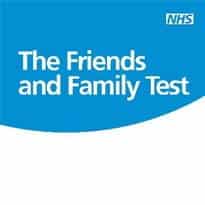Friends and Family Test review published
- 24 July 2014

NHS England has published a review of the Friends and Family Test which shows that response rates are lower than other national health surveys.
Although 78% of trusts report an increase in emphasis on patient experience, the review also emphasises that there are improvements to be made as it is not “fully succeeding in informing patient choice” about NHS services.
The test, which asks every patient whether they would recommend an NHS service to their friends and family, was first announced by Prime Minister David Cameron in January 2012 and was introduced to acute trusts in April 2013.
In September last year, NHS England announced that by 2015, all GPs, community and mental health services will also collect the FFT data.
Commenting on the review, Tim Kelsey, NHS England’s head of patients and information said the key aim in setting up the FFT is for the results to be “transparently published and available to inform patient decision and choice.”
“As we roll out FFT to the whole of the NHS its value will be further strengthened,” he said.
“I hope that this will create a culture where patients expect to be given the opportunity to give feedback, and NHS staff value and act upon patients’ needs and wishes.”
The test should be offered to all eligible patients in inpatient departments or A&E within 48 hours of discharge, but the way trusts collect the data has not been specified. As a result, data collection methods vary and the FFT has had generally lower response rates national health surveys in similar settings.
The review found that in February this year, the inpatient response rate was 34.2% and the A&E response rate was 18.6%.
“The evidence suggests that we should continue to learn how best to gather patient experience data from A&E, since this poses particular challenges,” it says.
“In particular, many people who are asked at the point of departure in A&E may not have had a chance to reflect on the experience they have received in a clear and lucid fashion.”
Compared to other surveys such as the National Inpatient Survey 2013, which achieved a 49% response rate, and the National Accident and Emergency Department Survey 2012, which received a 38% response rate, the FFT is not performing well.
“Many factors may contribute to the lower response rates of FFT, such as the fact that FFT is usually only offered once to individuals, whereas reminder letters or additional questionnaires are commonly distributed to survey non-respondents,” says the review.
“The point of discharge setting of FFT can also prove challenging, especially in A&E, as patients may be keen to go home or may be in a state where they do not want to be giving feedback.”
The review adds that the strength of the test is the “real-time nature” of the data, which allows staff to understand what they are doing well and where to improve.
It says that one way to produce fully comparable data would be to administer the test centrally in order to eliminate different approaches across trusts. However, the review adds that there are several risks attached to that approach.
” These risks are particularly salient when considered in light of the underuse of nationally collected survey data by trusts,” it says.
The review recommends that the test is not nationally centralised, but that a “number of steps” are taken to improve data quality, including: highlighting best practice on the design of data collection materials; removing incentives and motivations such as league tables and discouraging the use of payments attached to certain scores.
“We are going to continue to look at what the FFT data tells us and how we can continue to improve the way it is collected and used,” said Kelsey.
“This will include work to examine how we can make FFT more comparable to further increase its future usefulness in helping patients make informed choices.”




